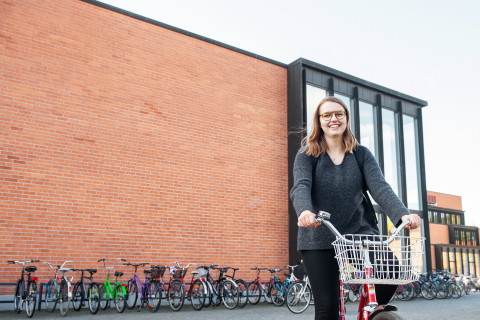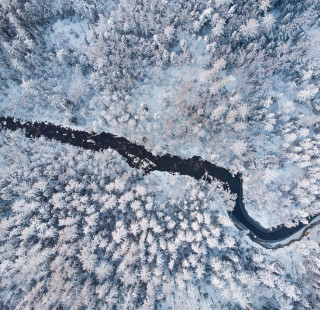The University of Eastern Finland has agreed to promote the UN Sustainable Development Goals (SDGs) in all its operations. Sustainability and responsibility are also the key development principles for the university campuses.
The university has signed the Society’s Commitment to Sustainable Development as part of the implementation of the Sustainable Development Agenda 2030 in Finland, and we also adhere to the SDGs through our Green Office and Fairtrade agreements.
The university’s efforts to achieve the SDGs are twofold. As a scientific community, the university’s education is based on research and evidence-based information and the impact these have on society. As a work community, the university’s day-to-day operations support the achievement of the SDGs. We develop the university campuses and operations with the aim of minimising their impact on the environment.
In accordance with its Climate Action Plan, the university is committed to taking action to mitigate the effects of climate change with the goal of the university becoming carbon neutral by 2025.
Sustainable university
The University of Eastern Finland has specified sustainable development as one of its guiding principles. All aspects of sustainable development – ecological, social, financial, and cultural – are taken into account at the university. Our operations are governed by the principles of equality and non-discrimination, and openness and accountability are also promoted in communications.
Sustainability and responsibility are embedded in the university’s strategy and in its performance and quality management systems. Sustainable development at the university is coordinated by the Advisory Board for Sustainable Development. The university’s Quality Coordinator and the persons responsible for quality at each unit are in charge of the practical implementation of sustainable development efforts.
The areas in which the university has the most impact on the environment are energy consumption, mobility, food, and the sorting of waste and other materials.
The university’s actions taken with its cooperation partners and other actors to mitigate the impact on the environment are a continuous process. Here are some examples of the efforts and actions.

Eight steps into the future – goals in a nutshell
UEF aims to achieve carbon neutrality (scope 1.2 and 3) primarily by avoiding emissions and reducing the amount of emissions generated. The aim is to find the most reliable way to compensate for the remaining emissions. Carbon neutrality is linked to the other seven areas of the programme.
UEF campuses are modern, energy-efficient and functional in terms of their use of space. The University of Eastern Finland is actively involved in the development of facilities together with University Properties of Finland Ltd (SYK).
SYK is the owner of the facilities and rents them to UEF. SYK is owned by Finnish Universities, including UEF, and the Finnish government. SYK has its own ambitious sustainability goals and UEF facility services work closely with SYK to fulfill them. Through SYK, UEF is also for example, part of Energy Efficiency Agreements.
Kuopio campus solar panels
Melania building on Kuopio campus has 78 solar panels on it's roof.
Electricity used by UEF comes from 100 % renewable sources
Since 2018 all the electricity purchased by UEF has been completely from renewable energy sources. Since 2020 facilities have also utilized demand-side management.
UEF also aims with the help of SYK, local cities and energy providers to increase the use of renewable energy sources in its heating. For example as a part of the climate partnership with the city of Joensuu, the aim is to increase renewables to 80 % of district heating.
LEDs and automated lighting
LED lights have been installed during renovations. Lights are also optimized according to natural light from outdoors. Many building also have automated lighting that work by detecting movement.
Waste reduction and increased recycling
Waste is reduced already during procurement, especially unnecessary plastic packaging is avoided. Recycling is constantly being improved in UEF facilities. For example in 2020 plastic recycling began.
Restaurant services have reduced single use plastics by removing straws, spoons and coffee cup lids or replaced them with more sustainable options.
Water usage and management
Water usage is reduced by using water efficient appliances.
Waste water is managed according to the Finnish Water Act, ensuring safe and good quality water and no harm to the environment.
Campus biodiversity
On the campus areas, we want to generate positive impacts for biodiversity. Our vision is campuses with diverse species of living organisms suited for the urban environment.
The University of Eastern Finland is a financially responsible operator who takes into account the principles of sustainable development and responsibility in all its investment activities and procurements.
Sustainability criteria is set for products and service providers already during the tendering process. University's sustainability guidelines also apply to them.
Flying is more infrequent and emissions caused by travelling decrease as travelling is deliberated more carefully than before and replaced by using remote connections. Students and employees have good opportunities and incentives to arrive on campuses using low-carbon means of transport.
The university’s campus restaurants serve healthy and nutritious food, which is also as ecologically and socially sustainable as possible. Vegetarian dining is encouraged with attractive meals and lower prices.
Campus restaurants also do their part in reducing waste. For example, plastic straws, spoons and coffee cup lids have been removed from restaurants or replaced with more sustainable options. Restaurant services also aim to minimize food waste in their own practices and customers are encouraged to minimize their own waste with food waste scales.
Restaurant services are provided by a 3rd party company that is tendered every few years. Sustainability requirements for the service are set already during the tendering process.
UEF promotes the diversity, equality and inclusion of staff and students. The aim is for everyone to have the opportunity to participate in the university’s activities, make progress in their studies and have an impact on their work. Campus environments are safe and healthy, as well as accessible.
University that supports well-being
UEF invests in the well-being of its students and staff. Overloading of both staff and students is considered a serious issue. Members of the university community are provided with sufficient high-quality services to promote their health. Special attention is paid to mental health and coping, especially during and after the coronavirus pandemic.
- Students receive health care services on campus through Finnish student health service (FSHS).
- Study psychologists offer counselling to bachelor’s and master’s degree students.
- Occupational health care is preventive by nature.
Smoke-free campus
UEF is a smoke-free campus. Smoking is allowed only in designated outdoor areas.
In line with its strategy, the University of Eastern Finland aims to find solutions to global challenges through interdisciplinary research and multidisciplinary education. This helps in building a responsible and sustainable future.
The University of Eastern Finland is an active communicator in matters associated with sustainable development and responsibility. Communication effectively reaches different target groups, such as students, staff, stakeholders and a wider audience.
The university’s Climate Action Plan and commitments
Sustainable development at the university is organised and developed by the University of Eastern Finland Advisory Board for Sustainable Development. Established ten years ago, the Advisory Board for Sustainable Development organises events each year, coordinates campus farming on both campuses, makes initiatives for sustainable development measures to improve waste sorting, for example, is in charge of the university’s reporting on sustainable development and the related commitments, and periodically carries out sustainable development audits at the university’s units. At the University of Eastern Finland, sustainability and responsibility are also embedded in the university’s quality management system.
The University of Eastern Finland has participated in the UI GreenMetric University Rankings since 2016, and in the Time Higher Education THE Impact Rankings since 2018. Both of these global rankings assess about a thousand universities against the UN Sustainable Development Goals. In the rankings, performance is assessed based on several criteria, and the information provided by the participating universities must be verifiable. The University of Eastern Finland ranks among the top 100 universities, with roughly a thousand universities participating each year.







